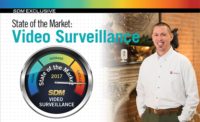Leveraging the Homeland Security Market
With the security industry undergoing a rapid transformation in many respects, from technology deployments to executive responsibilities, it is important to cultivate new business relationships and uncover additional sales opportunities. Homeland security funding is ongoing and can supplement revenues in a down economy. Security integrators can find opportunities during tough times by embracing business outside their traditional markets. Understanding the opportunities in the homeland security market is a great starting point.
I am fortunate to attend a variety of security conferences throughout the year and recently found an excellent venue for security professionals. The Aspen Security Forum (www.aspeninstitute.org) is a premiere event and I highly recommend it for anyone interested in leveraging the homeland security market. I was happy to see Axis Communications and The Security Executive Council among the 400 attendees participating in what was the best security conference I have ever attended. I only wish more integrators and physical security practitioners were in attendance.
Government agencies such as The Department of Homeland Security (DHS) and the Transportation Security Administration are partnering with our intelligence community to defend the nation, and simultaneously driving many security requirements that trickle down to the physical security and IT domains. Being able to ask these security professionals what they need in next generation solutions and partnerships was worth the price of admission alone.
The star-studded agenda included a pre-opening keynote by Admiral Michael Mullen regarding national security challenges. Other keynote speakers included Jane Holl Lute, deputy secretary of The Department of Homeland Security, Fran Townsend, former assistant to the president for homeland security and counterterrorism, Bill Bratton, former Los Angeles police chief, Richard Clarke, former special advisor to the president on cybersecurity, Michael Leiter, director of The National Counterterrorism Center and Michael Chertoff, former secretary of the Department of Homeland Security. In addition to these excellent addresses, the break out sessions included former senators, ambassadors, current chief executive officers, senior level executives and policy makers. The moderators for these events were a Who’s Who of television and print media including 60 Minutes, The New York Times, The Washington Post, CNN, Fox News, and National Public Radio.
The networking opportunities were abundant, as all of these folks were both approachable and helpful. It might have been the setting of Aspen, Colorado or the worldwide reputation of the Aspen Institute that was the draw, but the ability to rub elbows with key executives and policy makers was outstanding. Additional sessions included experts who discussed emerging trends and security requirements for aviation security, maritime security, mass transit security, cybersecurity, border security and a panel on “Innovation, R&D, and New Technologies.” The Q&A included DHS buyers interacting with numerous vendors regarding request for proposal (RFP) issues and procedures. It was informative. Each panel had a Q&A session averaging 30 minutes and was followed by a 15 minute break.
The Aspen Security Forum is not an exhibitor event, however I had conversations with companies like Raytheon, Boeing, Microsoft and IBM, as well as start up companies and venture capital firms looking to build integrator relationships and extend sales and support channels. I found myself referring many of the companies and integrators I see at the ASIS, Security 500, Securing New Ground, and ISC East / West events. I also gave several plugs for the Security Industry Association and made a few introductions to The Security Executive Council. Consider attending next year’s event or another homeland security conference. I am confident that you will leave with many contacts and new business opportunities. The security profession is evolving, so should your business model.
Dan Dunkel brings more than 22 years of sales, management, and executive experience in the IT industry to a consulting practice, New Era Associates, focused on the emerging field of security convergence. He is co-author of Physical & Logical Security Convergence.
Looking for a reprint of this article?
From high-res PDFs to custom plaques, order your copy today!





